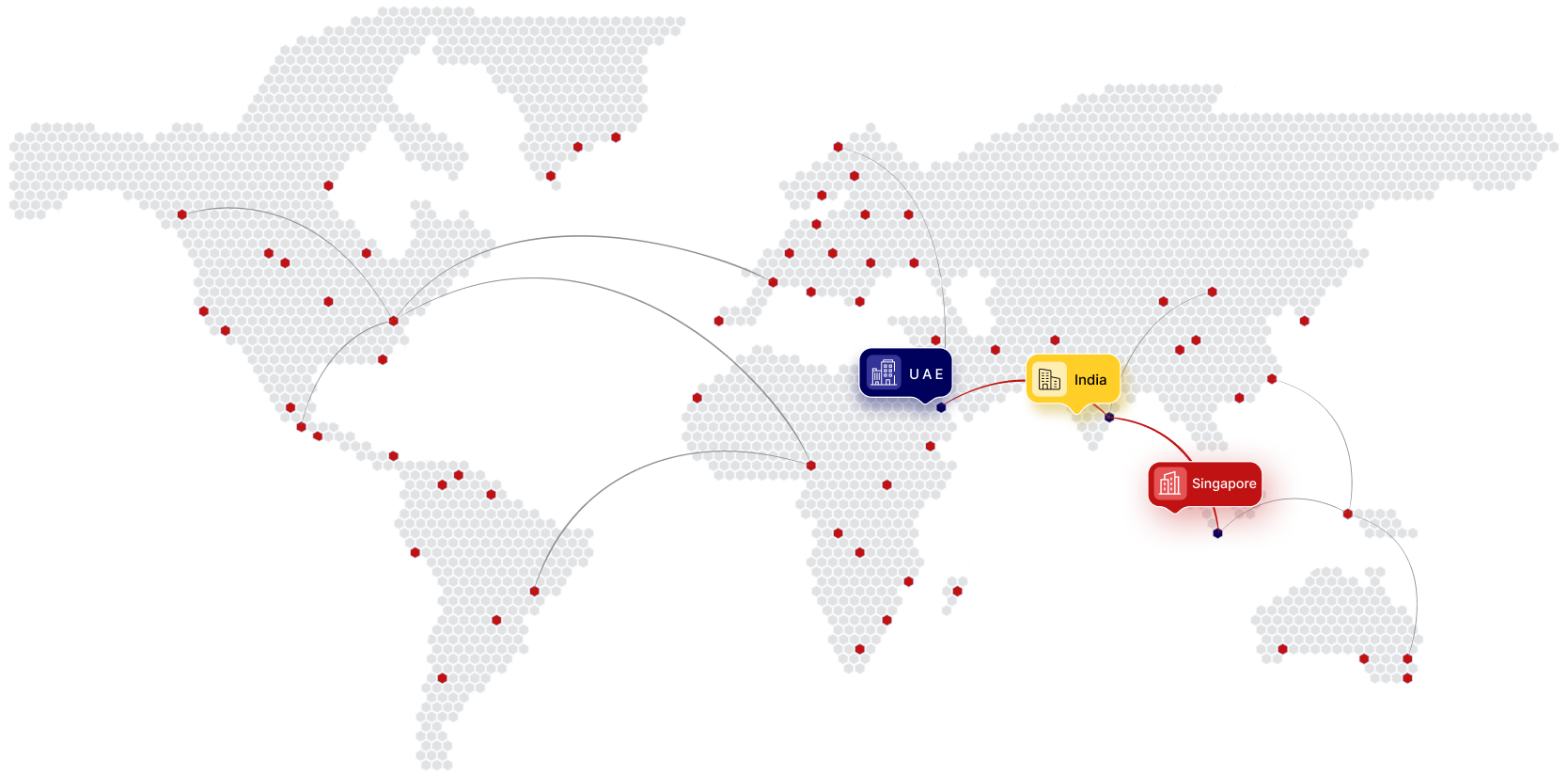
- NEWSLETTER, GLOBAL
- January 10, 2024
Now that we are already into 2024, it’s time to have a look at the significant transformations in Governance, Risk, and Compliance (GRC). With global end-user spending on risk management and cybersecurity projected to reach $215 billion, the dynamics of GRC programs are evolving rapidly. As a forward-thinking business, you would be interested to know about governance risk management and compliance trends and seek professional solutions from experts.
It’s time to explore the key trends that will shape the GRC landscape this year.
- AI Revolutionizing GRC
- Connected GRC Strategy for Enhanced Visibility
- Turning Risks to Rewards through Continuous Control Monitoring
- Proactive Compliance as a Business Imperative
- Cyber Risk Optimization for Resilient Enterprises
- Third-Party Risk Management Takes Center Stage
- Better Resilience Can Define Risk Management
- Gaining strategic advantage by quantifying non-financial risks
- Integrated Platforms for Simplifying GRC
- Empowering The Frontline in Risk Management
AI Revolutionizing GRC
Connected GRC Strategy for Enhanced Visibility
Turning Risks to Rewards through Continuous Control Monitoring
Traditional control testing and monitoring fall short in the face of evolving organizational complexities. A study involving 500 risk leaders revealed that 70% consider access to optimized real-time alerts to mitigate the effect of serious risk events significantly. The evolving complexity of organizations renders traditional control testing and monitoring insufficient.
Operating in 2024, businesses need to prioritize real-time risk visibility and continuous control monitoring. This approach strategically monitors and tests security controls, detecting risks, issues, and potential threats automatically from diverse sources of data.
Proactive Compliance as a Business Imperative
The True Cost of Compliance report highlights an 18.8% surge in financial crime compliance expenses since 2020. Tackling such regulatory changes accompanied by compliance costs requires organizations to adopt a proactive stance. This involves leveraging AI on a centralized platform to automate recommendations and integrate enterprise systems with effective compliance and risk management systems to uniformly view compliance.
Cyber Risk Optimization for Resilient Enterprises
Third-Party Risk Management Takes Center Stage
Better Resilience Can Define Risk Management
Gaining strategic advantage by quantifying non-financial risks
Integrated Platforms for Simplifying GRC
Empowering The Frontline in Risk Management
With the spotlight shifting to the frontline in risk management, it’s crucial to delegate more responsibilities to the frontline along with comprehensive training and tools. Advanced GRC technologies, including conversational interfaces and AI/ML, will streamline frontline engagement.
The IMC Group remains committed to empowering organizations with governance risk management and compliance solutions to explore the ever-evolving GRC landscape. With professional assistance on the side, businesses can secure their operations as they stride ahead.

- NEWSLETTER, GLOBAL
- January 10, 2024
As we reflect on the conclusion of COP28 in Dubai, it’s imperative to take a look at the key takeaways that are likely to shape the future of global climate action. This event was hosted under the CEO of a prominent UAE-based state-owned oil company, Sultan Ahmed Al Jaber. The insights are likely to shape strategies governing ESG for Businesses in the coming years.
Here are the key insights from COP28 that readers would be interested to know.
The Move Towards Sustainable Energy Sources
Debate over the Climate Deal
Challenges with Climate Finance
Commitment to Renewable Energy
Reducing Methane
Failure of Carbon Offset Negotiations
Why Do Companies Need ESG Services?
Post-COP28, national policymakers are likely to translate these climate priorities into legislative actions. Beyond oil and gas, other industries will be closely monitoring and adapting to the evolving regulations, considerations on supply change, and ESG norms. Forward-thinking businesses consult professionals like the IMC Group for ESG Services. With dedicated assistance, businesses can avoid reputational and legal challenges, embracing sustainability practices in every department.

- NEWSLETTER,U.A.E
- January 10, 2024
Planning to invest in off-plan properties in Dubai? As a forward-thinking investor, you would like to secure your investment. Successful investors habitually seek due diligence services in Dubai to ensure they remain on track with legalities. At the same time, it’s imperative to assess your ROI and secure your property at the lowest cost, besides benefiting from a favourable payment plan.
However, capitalizing on such lucrative opportunities calls for a deep understanding of the country’s regulatory framework regarding these dealings.
In this edition, we are going to explore the key guidelines mentioned in Dubai Law No. 13/2008 regarding Real Estate Registers. This will present you with a comprehensive roadmap for acquiring off-plan properties successfully in Dubai.
Key Aspects to Focus on While Purchasing Off-Plan Property
1. Registration and Compliance
2. Acquiring the Land
3. Legal Due Diligence
Legal due diligence buying property in Dubai involves a verification process with the government authorities like the Real Estate Regulatory Agency or the Dubai Land Department. During this step, the property is registered in the presence of an escrow account while the necessary permits are obtained.
4. Transparent Application Processes
5. Protecting the Rights of Buyers
6. Completion and Registration Protocols
7. Stringent Contract Formalities
8. In Cases of Violation
Seeking professional support for legal due diligence

- Article, Global
- January 3, 2024
Venturing into international markets is an appealing opportunity for companies seeking expansion, access to new markets, a broader range of skilled professionals, and various other advantages.
Indeed, expanding globally comes with inherent risks. These include increasing interest rates, inflation, geopolitical tensions, supply chain interruptions, and additional challenges. Multinational corporations are focused on mitigating these risks while actively seeking the advantages linked with international expansion.
Certain multinational companies are investigating options beyond the conventional method of international expansion. This traditional approach typically includes creating a legal entity in the desired country, initiating a local payroll system, and directly recruiting and compensating staff.
This article provides an overview of an alternative approach offering lower risk and flexibility than traditional international expansion methods. Additionally, it highlights essential aspects service providers often watch or restrain when pursuing this path.
Scaling Horizons Enterprises need to meticulously assess their alternatives prior to venturing into global markets, ensuring the selection of the most advantageous resolution in accordance with the regulations of the destination nation, short- and long-range corporate tactics, and additional variables. It is crucial to bear in mind that every nation possesses distinctive regulations governing taxation and labor, along with a variety of legal entity alternatives. This segment aims to furnish overarching insights into prevalent alternatives, encompassing advantages and pitfalls, and is not all-encompassing.
Engaging Independent Contractors
Non-Resident Employer Registration
Partnering with an Employer of Record (EOR)
An employer of record (EOR) or EOR provider is a company with an established local legal presence in a specific country. When a growing organization opts for an EOR, this provider hires local workers, pays them in the local currency, offers benefits, and manages income and social security tax payments to local authorities. Simultaneously, the growing company (the client of the EOR provider) supervises and directs these workers. Importantly, using an EOR solution means the expanding organization doesn’t have to establish its legal entity or payroll system in the target country.
Employer of Record services is not designed as a lasting employment resolution. Depending on regional regulations, the type of operations, the workforce size, and additional considerations, an entity might activate a permanent presence and associated responsibilities.
Local Entity Setup
Exploring Markets Securely & Risk Reduction via EOR
The overview of expansion choices above emphasizes that creating a local legal entity is the most compliant and adaptable approach for entering a new country. However, initiating a legal entity in a new market signifies a substantial commitment, with the process being both costly and time-consuming, especially when considering the potential need to close it down later.
On the contrary, an EOR offers a company a relatively low-risk and swift method to expand internationally and, if needed, withdraw from the market. During periods of intense global economic or geopolitical uncertainty, or when a company isn’t entirely confident about the benefits of entering a new market, an EOR can be especially attractive. It enables an organization to evaluate market feasibility, workforce potential, and customer demand while minimizing expenses, legal intricacies, administrative burdens, and compliance risks.
Moreover, numerous EOR providers operate across multiple countries, allowing companies to test markets in diverse jurisdictions simultaneously. This comparison of outcomes can significantly influence their future operational strategies.
Determining the Transition from EOR to a Legal Entity
It’s crucial to note that an EOR arrangement isn’t intended for long-term use, nor does it provide a company with the ability to thoroughly conduct a broad spectrum of business operations within a country. Significantly, relying on an EOR might constrain an organization’s expansion within the target country. Depending on local tax regulations, enforcement trends, and other factors, if a company gradually hires an excessive number of workers under an EOR, it faces the risk of establishing a taxable presence, also known as a permanent establishment (PE). Therefore, it’s imperative for businesses utilizing an EOR to monitor their local headcount and operational activities closely.
As the risks of establishing a permanent establishment (PE) rise, a company must contemplate creating its local legal entity and transitioning EOR employees to the new entity’s payroll. Alternatively, the company might terminate its association with the EOR and withdraw from the market.
Triggering a permanent establishment involves navigating a complex and, at times, uncertain terrain. Hence, a company facing this situation should engage a third-party expert well-versed in local tax and labor laws to comprehend the advantages and drawbacks of continuing with an EOR. Generally, a company should utilize an EOR for two years or less before setting up its own legal entity or exiting the market.
Sometimes, EOR providers downplay or omit the risks related to permanent establishment (PE). Hence, it’s crucial to either partner with an EOR service provider capable of setting up legal entities, bank accounts, and payrolls in the expansion country or enlist a third-party advisor to accurately evaluate when to transition from the EOR to the company’s independent legal entity.
Establishing a legal entity might extend up to six months in select countries, so organizations should plan well in advance. Despite the potential expenses and time investment, creating a legal entity becomes more cost-efficient than utilizing an EOR once a company achieves a particular scale in a market. Additionally, it grants organizations the freedom to expand without concerns about their tax status.
It’s crucial to grasp that while an EOR offers a speedy, low-risk method to kick off operations in a new place, it might not suit every expansion scenario. Depending on various factors such as the target country, corporate strategies, planned activities, the number of employees involved, and other considerations, initiating a legal entity from the start could be more suitable.
Departing the Market
As previously mentioned, one advantage of using an EOR provider to enter a new market is the relatively swift and economical process of discontinuing the association and exiting the market if your plans alter or your endeavours don’t yield the expected advantages. Conversely, winding down a legal entity can be costly and typically spans around six months.
Should an organization utilizing an EOR depart from the market for any reason, it’s crucial to provide advanced notice to local employees and the EOR provider. Contractual or compliance obligations regarding employee notification and the continuation of benefits might exist. Additionally, terminating an engagement before the end of a calendar year might sometimes entail tax or other responsibilities.
Lastly, it’s worth noting that an EOR can serve as a viable option for organizations winding down a legal entity in a specific jurisdiction yet aiming to sustain a presence in the market. Just as an EOR presents a relatively low-risk market entry, it mitigates risks associated with a complete market exit by enabling the organization to uphold local relationships, cater to local clientele, and retain valued employees.
Bringing on board new employees for your company can often be challenging. IMC offers an EOR & PEO structure to streamline this process, enabling you to recruit fresh talent without establishing a new entity.

- Article, Global
- December 27, 2023
Background:
The topmost healthcare company recently faced unique challenges regarding Governance, Risk, and Compliance (GRC). These challenges arise due to the highly sensitive nature of patient data, complex regulations and the constantly evolving technology landscape.
The key challenges include ensuring data security and privacy, complying with healthcare regulations, managing risks related to clinical trials and medical research, and maintaining compliance while adopting new technologies.
Solution:
Key Elements:
Leveraging Technology and Expertise:
Result:
IMC initiatives drive precision and advancement in healthcare GRC. Our tailored solutions enable healthcare entities to safeguard patient data, adhere to stringent regulations, and effectively manage risks inherent in clinical trials and research endeavors. Here, a healthcare entity uses a knowledge graph to oversee risks related to clinical trials. The knowledge graph compiles extensive data, including trial details, patient involvement, trial progress, and medical research outcomes. By connecting information within this vast dataset, organizations can enhance patient safety, comply with regulations, and expedite drug development processes.
Precision is crucial in healthcare. This concerted approach fosters a secure and compliant environment conducive to adopting innovative technologies to improve patient care. IMC continues to be a driving force in enhancing GRC standards within the ever-evolving healthcare landscape.
Conclusion:
The company boosted its GRC capabilities by harnessing knowledge graphs, establishing itself as a pioneer in adopting advanced technologies for comprehensive governance, risk management, and compliance. The dynamic nature of the knowledge graph allowed them to stay ahead in a swiftly changing regulatory environment.
Explore the future of GRC with us, uncovering its potential to enhance efficiency and effectiveness in your organization’s GRC strategies. Our commitment to revolutionize GRC in government institutions showcases our dedication. IMC continues to elevate GRC standards within the demanding governmental sector through strategic partnerships, expertise, and tailored solutions.

- NEWSLETTER,U.A.E
- December 18, 2023
Essentials for Corporate Tax Registration:
- Enrollment and Withdrawal: It’s highly recommended that all eligible taxable person register for Corporate Tax through the Federal Tax Authority (FTA) without delay. Non-residents earning income from the state have specific factors to note. Timely submission of a Tax Deregistration application is crucial to evade penalties.
- Financial Reports and Accounting Approaches: The significance of financial statements in assessing taxable income is paramount. Your choice between a Cash Basis or an Accrual Basis of Accounting depends on your revenue. Adherence to International Financial Reporting Standards (IFRS) and meticulous record-keeping are vital.
- Submitting Applications and Making Choices: Businesses aiming to capitalize on Corporate Tax Law provisions might need to apply or make specific elections. Determining when FTA approval is necessary for exemptions, joining tax groups, and specific relief applications is essential.
- Filing Taxes and Settling Payments: Corporate Tax functions through a self-assessment system. To prevent penalties, it’s crucial to submit tax returns and payments promptly, within nine months after the relevant tax period’s end. In the case of tax groups, the parent company takes charge of filing.
Key Dates to Mark in Your Calendar: (Registration Process Already started)
| End of Financial Year | Initial Reporting Period | Date of Registration | Deadline for Submitting Initial CT Return and Payment | Deadline Initial Submission of Transfer Pricing Disclosure Form |
| Dec-23 | Jan 2024 to Dec 2024 | Registration Process Already started | 30th Sep 2025 | 30th Sep 2025 |
| Jun-23 | Jul 2023 to Jun 2024 | Registration Process Already started | 31st Mar 2025 | 31st Mar 2025 |
Get Started on the Path to Smooth Tax Registration
Required Documents for UAE Tax Registration
In the UAE, corporate tax applies to businesses with taxable income. The corporate tax rate stands at 0% for earnings up to AED 375,000 and 9% for earnings surpassing AED 375,000.
In readiness for corporate tax registration, individuals liable for taxation require the following documents:
- Photocopy of a valid Trade License
- The license-owning owner/partners must provide copies of their valid Passport and Emirates IDs
- Power of Attorney (POA) / Memorandum of Association (MOA)
- Contact information of the relevant individual and the company
- Report on the annual financial audit
Reasons to Consider Why IMC?
Navigating the complexities of corporate tax can be daunting, which is where the IMC team excels. Armed with in-depth knowledge of the latest UAE Corporate Tax regulations, we will simplify the process for you.
Leverage our team’s extensive experience to ensure precise and punctual compliance with Corporate Tax Law. Entrust us with the finer intricacies while you focus on your core business operations.
Navigating the complex landscape of corporate tax registration in the UAE can be challenging. However, with our IMC expertise in taxation and regulatory compliance, we empower businesses to navigate these complexities confidently. Our commitment to you is to provide the necessary knowledge to ensure seamless integration into the UAE’s tax framework.
For any queries or further clarification, reach out without hesitation. Please consider us your allies, ensuring a smooth and compliant corporate tax journey.

- NEWSLETTER, GLOBAL
- December 13, 2023
The efficiency and compliance of global payroll services go a long way in shaping the evolving environment for international businesses. Forward-thinking organizations are striving to retain talent and carve a positive image for themselves in the market. With global payroll solutions from established teams of experts, successful companies are streamlining their operations.
According to the ADP Global Payroll Survey of 2022, payroll data has a critical role to play in organizational decision-making.
- As much as 98% of organizations are reliant on this data for cost management strategies
- 97% of the organizations shape their growth strategies based on payroll data
- 81% of businesses use payroll data for facilitating DEI (diversity, equity, and inclusion) strategies
While the value of payroll management services is undeniable, organizations continue to encounter challenges in this pursuit. Around 72% of businesses believe that they need to upskill their payroll staff while adapting their current operations to fulfil the changing working conditions across the globe.
Also, around 50% of businesses are grappling to find external talent for their key payroll management positions.
The IMC Group is committed to addressing these challenges and helping organizations leverage accurate and streamlined information. Besides offering global mobility services, we deliver sophisticated global payroll services to different players in the industry.
Now, we will take you through the common challenges in global payroll management.
Common Challenges in Global Payroll Management
Complexity
Compliance
Consistency
Expert Recommendations to Streamline Payroll Processes
The process of payroll management keeps evolving, considering global regulations, local laws, and business priorities. These aspects often trigger significant shifts in operations related to global payroll management. No wonder, why businesses need streamlined solutions to scale up and meet the future requirements in their respective industries.
Here are some of the common components of global payroll solutions.
- Standardizing Processes: A standardized payroll management solution should seamlessly operate across multiple markets across the globe under different government regulations. Besides, it should help your organization with a single system to maintain records capable of comparing and combining data.
- Automated Systems: Outsource payroll management tasks to eliminate manual work like compliance checks, data entry, or running reports. This goes a long way in eliminating errors and freeing up your workforce to tackle other projects on priority.
- Unifying the System: Embrace a system capable of accessing multiple sources of data to integrate valuable information into one solution. This will reduce the complexity of the organization across departments.
- Data Security: Get a payroll solution that verifies employee data and keeps it secure. For instance, regulatory norms in the EU require data consent to be provided freely, and no business can ever assume the same. Thus, organizations need to take adequate measures to protect data and delete it if necessary.
Best Practices to Enhance Payroll Performance
The IMC Group suggests some of the best practices to enhance payroll performance to streamline global payroll solutions. Focus on these best practices, as recommended by our experts.
- For Employees: Make payroll easy to use, while enhancing transparency by offering self-service options to empower employees.
- For Stakeholders: Stakeholders need to understand workforce trends and optimize the use of resources by integrating multiple sources of data.
- For Practitioners: Practitioners need to be consistent during the onboarding process and get their processes optimized. The secret to success lies in prioritizing value-added activities over manual work.
- For Organizations: Make data-driven decisions, as you collect, curate, and analyze payroll data. This will significantly help you create insightful, intuitive, and proactive processes.
Outsource Your Payroll Management Services
Successful organizations understand that effective and accurate payroll services ensure better employee satisfaction, streamline internal processes, and mitigate compliance risks. The IMC Group continues to be your reliable partner for handling global payroll management services. For Effective International HR Outsourcing and global payroll management, you can reach out to us.

- NEWSLETTER, GLOBAL
- December 13, 2023
The global Finance and Accounting BPO Market looks in good shape, and reports reveal that this sector is likely to witness a healthy growth trajectory at least till 2029. Our in-depth analysis, in collaboration with esteemed industry leaders, portrays a comprehensive image of the current and future market trends. This will help you get actionable insights that will facilitate informed decision-making. Before we delve into the growth trajectory, have a look at the top reasons to outsource finance and accounting services to dedicated professionals.
Market Overview
Key Players
Market Segmentation
The report also explores essential market segments that offer a holistic understanding of the Finance and Accounting BPO industry.
Based on product type, the market can be segregated into:
- SME (Small and Medium Enterprises)
- Large Enterprise
- Business Support Outsourcing Service
- Specific Functions Outsourcing Service
- Universal Terminal Outsourcing Service
Key Highlights of The Finance and Accounting Business Process Outsourcing Service Report
The Finance and Accounting BPO sector has witnessed a notable trend where key players are allocating substantial funds for R&D and cloud computing activities. The focus largely lies on innovation, which pacifies the development of the industry at every stage. This explains the value of remaining at the forefront of technological developments.
- Detailed study of the extent of competition in the industry
- Tentative volume and market value of bookkeeping and accounting business process outsourcing service finance
- Using tools like Porter’s Five Forces Analysis and SWOT for market analysis
- A comprehensive examination of the growth factors, penetration, and size of the global market
- Growth forecast of the accounting and finance business process outsourcing market
- A detailed study of service drivers, opportunities, constraints, gaps, obstacles, strengths, and challenges in the market
The Value of Outsourced Accounting and Bookkeeping Services
As evident from the report, forward-thinking players will be increasingly outsourcing their accounting and bookkeeping services. The IMC Group continues to be your trusted partner to meet specific requirements. We have set benchmarks in the industry, offering customization options to offer a comprehensive assistance to businesses in accounting and bookkeeping. We look forward to empowering your strategic decisions with our professional assistance.

- NEWSLETTER,U.A.E
- December 13, 2023
The UAE continues to stand out as a strategic business hub for global businesses of all sizes. Its supportive business environment and tactical location make it a preferred destination for organizations seeking scalability and growth. When you explore viable ways of a company formation in Dubai, you need to choose between the mainland and the free zone. However, your decision largely depends on several factors, including your target market, the nature of your business, and your goals. These factors often sum up to pose a challenge so overwhelming, that forward-thinking businesses count on professionals to remain on the right track.
As you brace up to incorporate your business in the UAE, check out these key insights that should help you make informed decisions and lead you to success.
Choosing the Right Setup: Free Zone vs. Mainland
In the first place, global businesses striving to expand in the UAE should choose between the mainland and a free zone. This choice should align with your business objectives. For instance, if you are running an export-oriented business and need foreign talent, opting for a free zone might be a strategic decision. This way, you can benefit from waived corporate tax, 100% foreign ownership, easy financing, and a more favorable regulatory environment.
On the other hand, if you are targeting the UAE market directly, particularly sectors like real estate, retail, hospitality, construction, and healthcare, setting up your business on the mainland will be a logical move.
Crafting Effective Strategies for Market Entry
1. Market Analysis with Research
2. Networking and Building Partnerships
3. Regulatory Compliance
Choosing the Right Legal Structure
A pivotal domain of incorporating your business in the UAE involves selecting the appropriate legal structure for your company. The most common options in the UAE include:
- Free Zone Company
- Limited Liability Companies (LLCs)
- Branch or Representative Office
- Sole Proprietorship and Civil Company
- Stock Company
Scaling Your Business Effectively
1. Strategic Planning
2. Acquiring and Developing Talent
3. Broaden your market reach
The process of business setup in Dubai involves several strategic decisions. Forward-thinking business leaders seek professional support from our consultants, who recommend effective market entry strategies. The IMC Group continues to be your reliable partner for establishing your business in the UAE. The experience of our specialists can position your business to embrace success in the long term amidst the dynamic business environment in the UAE.

- NEWSLETTER,U.A.E
- December 12, 2023
Challenges in Sharia-Compliant Estate Planning
- It’s challenging to address the evolving dynamics of local GCC assets within Sharia-compliant estate plans. There has been a visible shift toward increased inclusion and significance in comparison to non-GCC assets
- Another hurdle is to explore the uncharted territories of domestic estate planning solutions like the UAE federal trust regime and common law private foundations
- Managing the web of multiple (non-GCC) jurisdictions remains a challenge, which is influenced by the demographic location of family businesses and different nationalities or tax residencies of family members
- The absence of standardization and harmonization in legal frameworks governing Sharia-compliant estate planning across different GCC countries continues to be a challenge. For affluent families, this lack of uniformity poses significant challenges to encompass all their assets within the GCC
Emerging Trends Shaping the Future of Succession and Estate Planning
1. Domestic Structuring
2. Growing Wealth in the GCC
3. Increased Awareness of Estate Planning
4. ESG and Impact Investing
5. Family Offices Becoming Professional
6. Technology in Estate Planning
7. Affordability of UAE Foundation
8. Multiple Structures for Estate Planning
9. Professional Estate Planning Advisors
A Member Firm of Andersen Global
- 170+ Countries
- 390+ Locations
- 13,000+ Professionals
- 1800 + Global Partners

- 170+ Countries
- 390+ Locations
- 13,000+ Professionals
- 1800 + Global Partners

- 170+ Countries
- 390+ Locations
- 13,000+ Professionals
- 1800 + Global Partners












